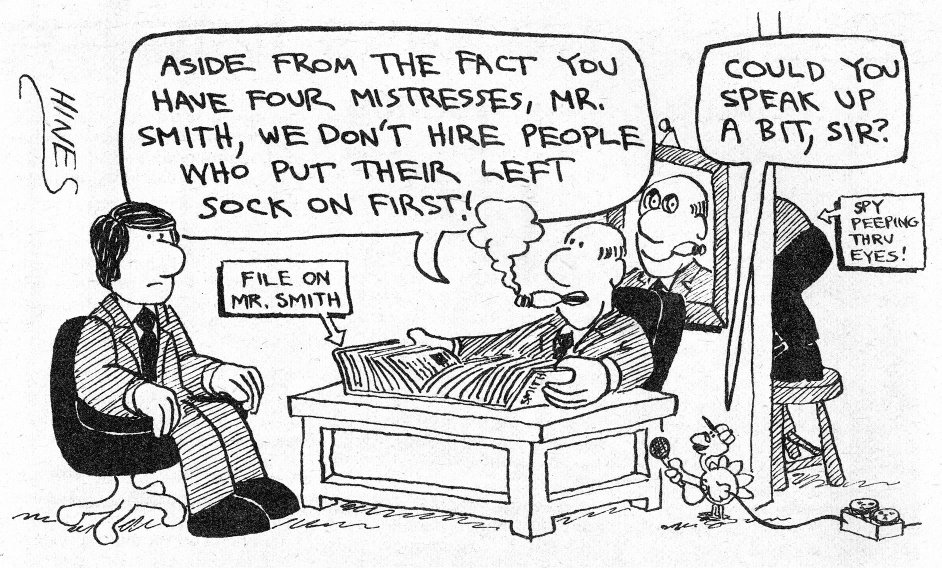previous Cartoon.
return to Index.
view next Cartoon.

Dec. 2, 1976
| Click to view previous Cartoon. | Click here to return to Index. |
Click image or here to view next Cartoon. | |
 | |||
| PRIVACY Dec. 2, 1976 | |||
|
Editorial Unless you are an extremely rare breed of hermit, you have probably filled out many forms, appications, records, and files over your years and had many filled out for or about you by other people. Personal data concerning yourself has been recorded on credit applications, employment and educational records, medical files, tax forms, and other record-keeping devices. Like it or not, you are open to scrutiny by a vast number of people for purposes of their own discretion. The volumes of written material kept by various public and private organizations, stored away in filing cabinets using archaic information retrieval systems, have given way to computerized "data banks" where information is available through easily run computers. Although this has the advantage of being more economical and time-saving for the operation involved, it has the disadvantage in that it makes your private life more vulnerable to people whom you may not want researching your life. And there is no way for you to make sure that confidential information remains confidential. Many people operate under the asumption that privacy is a basic right of every American as guaranteed by the Constitution. However, Jack Osborn, director of the Krannert Graduate School of Management's Information Privacy Research Center (IPRC), says, "Privacy as such is never mentioned by name in the Constitution. If fact, some legal scholars say there is no constitutional right to privacy." But Osborn goes on to quote an article published by the National Organization on Legal Problems of Education: "The right to privacy has origins in English common law and was explicitly written in the U.S. Constitution and the Third, Fourth, Fifth, Sixth, and Foureenth amendments. In the rights of 'life, liberty, and pursuit of happiness' lay more than merely physical aspects. Included were the right to opinion, ideas, and expression; the right to personal honor and dignity; and the right to privacy." Some researchers theorize that people will say less as they come to fear what will be done with what they say. This brings up the question of whether the centralization, and thus ease of access, of information indirectly impairs the freedom of speech. Two events which brought this into the limelight were the proposal for a national centralized information retrieval system which was put before Congress in 1968 and the more recent privacy issue which surfaced during Watergate in 1973. Although privacy was not the prime issue of the Watergate scandal, the abuses of personal records that came to light during investigations prompted Congress to enact the Privacy Act of 1974 which only regulates information handled by federal agencies. Osborn contends that few people actually know the purposes for which their personal information is used. "For example, it may be that it is easily understandable to the 'reasonable' employee that information about job performance will be used in deciding promotions. On the other hand, it may not be aceptable to that same employee that his personal information can be transferred outside the company when he applies for a new job, when his name and address are sold to a commercial mailing list company, or when his personal data are passed to the IRS or a law enforcement agency," Osborn says. In July, 1973, the Department of Health, Education, and Welfare issued a study entitled "Records, Computers, and the Rights of Citizens" which "assessed the impact of computer-based record keeping on private and public matters and recommended safeguards against its potentially adverse effects...." It was this report which helped to make privacy research a "hot" subject and contributed to the birth of the IPRC. Currently, the IPRC is working on such topics as the attitudes of white-collar employees toward corporate record keeping, the cost of information privacy in the private sector, and the personal information aspects of medical records. "The main purpose of this center is to explore information privacy areas which may require legislative initiative...(so) both private and public decision makers...are provided with timely and accurate data on which to base their decisions," Osborn states. George Orwell's 1984 is still off in the future, but it is getting closer with each new tape impregnated with someone's private data. Hopefully, due to the work being conducted at such centers as the IPRC, 1984 will be more than eight years away. --Rick Hines |
All work displayed on this page © 1976 Rick Hines & The Scroll.
Material may not be used without the artist's written permission.